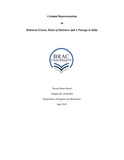Colonial representation in Robinson Crusoe, Heart of Darkness and A Passage to India

View/Open
Date
2013-04Publisher
BRAC UniversityAuthor
Nourin Binte SaeedMetadata
Show full item recordAbstract
Representation can be defined as the presentation of an object, individual, idea or entity not by drawing it as it is but by “representing” it or preparing it in a new structure or a new form. The discourse of colonialism defines “others” as colonial subjects by constructing them in a process of representation. Colonial representation presents semiotic meanings in which words, characters or situations often express contradictory or complementary impulses, attitudes. The various forms of representations like visual, textual actually show calculative “images” which are connected with power of inequalities and subordination. Colonial representation is a political representation that cannot be “natural” or “true”. It is constructed with false images, images that relate with colonizers ideology. In this dissertation my intention is to explore colonial representation through the novels of three European writers, E. M. Forster, Joseph Conrad and Daniel Defoe. These three writers deal with colonial discourses which reveal foreign cultures as “dark” and “depraved”. Representation of the minority image again and again comes as evil where European images are considered pure and superior.
In the first chapter I will look at the colonial aspects of Robinson Crusoe where an Englishman asserts and reasserts his Christian moral and British superiority in order to consider his sense of identity and I will also show how subjugation, domination, profit and power are reflected in the adventure fiction.
In the second chapter I will discuss how Conrad represents Africa in Heart of Darkness and establishes an imperialist ideology that represents the colonists and the colonized in a binary opposition. I will also show how Conrad portrayed the people? The west as rational and superior while the Africans - other as inferior.
In the third chapter I will explore the politics of representation of India and the colonial background of the novel A Passage to India which represents a masterly study of racial antagonism- two great races with different heritage and history, neither understanding other, nor even desiring to do so.
Colonialism is a practice of the powerful over the less powerful. It is defined as an occupation of workers territory by a stronger nation or state for “political domination” “economic exploitation” and “civilizing mission.” Through these novels these three authors deal with imperialism, racism, class and cultural conflict to show how colonialism creates false illusion to believe that the West is “self” and the East is “other”; one is “superior” other is “subaltern”. Representation is an important aspect of colonialism and according to Edward Said representations of the Orient both visual and textual is a kind of illusion not real rather than biased and constructed by “Western Ideology.”
